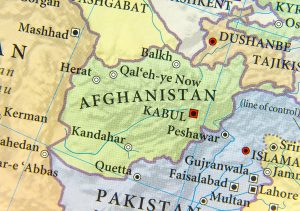In reviewing the Taliban government’s security achievements in 2023 on December 31, Afghanistan’s acting Defense Minister Mohammad Yaqoob Mujahid said that any attacks that did occur were “all carried out by foreigners, especially the citizens of Tajikistan.”
“Dozens of Tajikistan citizens have been killed in our operations and dozens of others have been arrested. Also, in the second step, Pakistani citizens have been involved in organizing many attacks,” Mujahid said, according to TOLO News. The defense minister did not offer concrete figures, though he did say that more than 20 Pakistani citizens had been killed in Taliban operations and dozens of others captured.
Mujahid meanwhile heralded the efforts fo the Taliban’s security forces, proclaiming that, as TOLO News reported, “the security forces have stopped 99 percent of smuggling of money, precious stones and currencies from inside Afghanistan in the past year” and had seized “tens of thousands of weapons.” He also claimed that there had been a 90 percent decrease in Islamic State attacks over the course of 2023.
The Taliban defense official accused unspecified neighboring countries of being the real centers of production, sale, and smuggling of weapons — accusations that have been lobbed against the Taliban, which arguably inherited quite a stockpile from the previous Republic government upon its collapse in August 2021.
Mujahid also rejected Pakistani claims that Afghan territory is a safe haven for the Tehreek-e-Taliban Pakistan (TTP or the Pakistani Taliban), calling those complaints “baseless.”
The veracity of Mujahid’s statements aside (he did not provide any details or evidence, per se), the sharp accusations fit into a sustained pattern of tension between Afghanistan and two of its neighbors: Pakistan and Tajikistan. Curiously, while Pakistani officials — notably then-Prime Minister Imran Khan — welcomed the Taliban’s return to power in 2021, relations between the two countries have become strained, with both sides lobbing accusations against the other of harboring their enemies. In November, Pakistan began a massive effort to deport “illegal migrants,” most of whom are Afghan.
When it comes to Tajikistan, Dushanbe has been the most hesitant to engage of Afghanistan’s Central Asian neighbors. As Shanthie Mariet D’Souza outlined in a mid-December article, despite some forms of engagement — such as the reopening of border markets in September and the transfer of the Afghan consulate in Khorog into Taliban hands — Dushanbe remains “the strongest critic of the Taliban in Central Asia.” Tajikistan, most notably, hosts a number of former Republic officials and members of the Afghan National Resistance Front (NRF). In November, Dushanbe hosted the Herat Security Dialogue (HSD) which drew together a wide array of Afghans, again many from the former Republic government and many who stand staunchly in opposition to the Taliban.
Dushanbe has not responded to Mujahid’s statement.
The Taliban in Afghanistan — even before its full return to power — put Jamaat Ansarullah (sometimes referred to as the Tajik Taliban, and banned in Tajikistan as a terrorist group in 2012) in charge of the border. The group remains the lead security force in five districts bordering Tajikistan and sits as a major point of contention. In August, for example. Tajik officials claimed to have stopped an attempted terrorist attack, with the purported Jamaat Ansarullah attackers crossing over the border from Afghanistan after having been trained and armed. The alleged attack was “deliberately planned by the intelligence services” the Tajik State Committee for National Security said.
In May 2023, journalist Franz J. Marty embedded with the Taliban forces assigned to guard the Afghanistan-Tajikistan border. He found that border forces were ill-equipped, overworked, and underpaid (if they are paid at all; many reported receiving no salary). Conversations with troops also revealed a heavy sense of paranoia about Afghan resistance forces and/or Tajik militants slipping across the border.
“Most Taliban, like the ones who felt shadowed by Tajik patrols on the other side of the river, are convinced that everyone is actively plotting to overthrow their Emirate,” Marty concluded. “Accordingly, the Taliban are set to continue patrolling their borders, looking for mostly imagined enemies.”
As the Taliban government tries to portray itself as a competent security guarantor in Afghanistan, this requires a narrative that can externalize any and all attacks that do occur. At the same time, Afghanistan’s neighbors have many of the same complaints about Taliban-run Afghanistan. Somehow, the enemies are always from elsewhere.

































